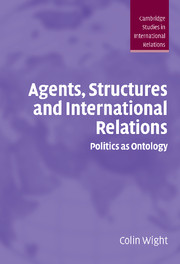Book contents
- Frontmatter
- Contents
- List of figures
- Acknowledgements
- Introduction
- 1 IR: a science without positivism?
- 2 The agent–structure problem: from social theory to IR theory
- 3 The agent–structure problem in IR theory: preliminary issues
- 4 Structure
- 5 Agency
- 6 The agent–structure problem: epistemology
- 7 The agent–structure problem: methodology
- 8 Conclusion
- References
- Index
- CAMBRIDGE STUDIES IN INTERNATIONAL RELATIONS
Introduction
Published online by Cambridge University Press: 22 September 2009
- Frontmatter
- Contents
- List of figures
- Acknowledgements
- Introduction
- 1 IR: a science without positivism?
- 2 The agent–structure problem: from social theory to IR theory
- 3 The agent–structure problem in IR theory: preliminary issues
- 4 Structure
- 5 Agency
- 6 The agent–structure problem: epistemology
- 7 The agent–structure problem: methodology
- 8 Conclusion
- References
- Index
- CAMBRIDGE STUDIES IN INTERNATIONAL RELATIONS
Summary
There is a way of thinking about International Relations (IR) that seems to saturate all theoretical discussion within the discipline. Although it can take different forms, the underlying logic of this mode of thought is simple to articulate: IR theory, so the argument goes, is structured by a set of deep epistemological (sometimes methodological) divisions that prevent the attainment of anything approaching an integrated body of knowledge. Attitudes to this issue vary. Some accept it at face value, albeit often with a sense of regret. Others consciously embrace and defend it, arguing that it provides the conditions under which theoretical pluralism might be safeguarded. Then there are those who attempt to provide a bridge across the divides in the hope of achieving a more comprehensive body of knowledge of the dynamics, processes and outcomes the discipline studies. This book suggests a different approach. There are simply no epistemological or methodological divides to accept, defend or bridge. If correct, the argument advanced in this book promises nothing less than a comprehensive reassessment and restructuring of the theoretical cleavages that divide the discipline.
But if there are no fundamental epistemological or methodological divisions that structure the discipline, how are we to explain the heated theoretical debates that regularly emerge and seem to confirm the existence of such a divide? There are two answers to this question. One locates the source of these debates and divisions in a form of disciplinary identity politics.
- Type
- Chapter
- Information
- Agents, Structures and International RelationsPolitics as Ontology, pp. 1 - 13Publisher: Cambridge University PressPrint publication year: 2006

